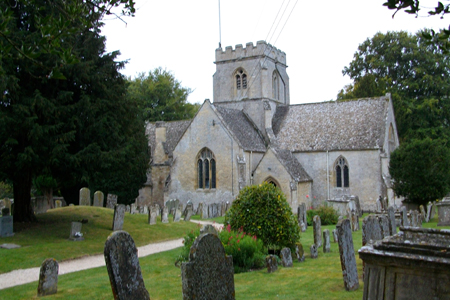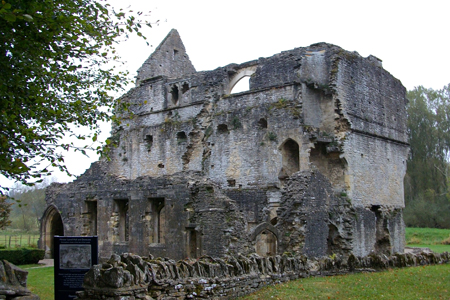| |
 |
 |
 |
| Comment on this report, or find other reports. |
 |
| Our Mystery Worshippers are volunteers who warm church pews for us around the world. If you'd like to become a Mystery Worshipper, start here. |
 |
| Find out how to reproduce this report in your church magazine or website. |
|
|
| 1824: St Kenelm,
Minster Lovell, Oxfordshire, England |
 |
 |
 |
Mystery Worshipper:
Jacobsen.
The church:
St Kenelm, Minster Lovell, Oxfordshire, England.
Denomination:
Church of England, Diocese
of Oxford.
The building:
The church was built by William, seventh Baron Lovell, in the
1450s, approximately ten years after the completion of Lovell
Hall. The ruins of the hall lie behind the church and can be
reached through the churchyard – one of the best kept country
churchyards I've ever visited, though there was no evidence
of sheep that I could see! The church is a wonderful example
of its period, cruciform in shape. Mass dials on the buttresses
used the sun's shadow to indicate service times. The north door
is enclosed by a porch with recesses, empty now, but which once
may have held statues and a holy water font. The tower pillars
are crowned with heads, perhaps those of King Henry VI and Lady
Lovell, among others. The inside is tiny and the space for pews
is limited, very little more than is given to the chancel with
its choir stalls. The interior was drastically renovated in
1869, broken stone fragments and odd pieces of stained glass
being all that remain of former columns, tombs and memorials.
At the entrance to the Lady chapel there is, however, a magnificent
alabaster tomb with effigy, presumably of the founding Lovell.
Among the baron's mourners carved thereon are the Blessed Virgin
and St Christopher with the Christ Child. The vestry, which
may at one time have been a hermit's cell, is outfitted with
squints, one looking in from the churchyard and the other looking
out to the altar. Lepers or other undesirables could thus have
a peep in at the goings-on.
The church:
This is the village church. My visit coincided with the harvest
festival, and the decorations accorded with this. Even in this
tiny place, increased mobility of travel has led to a less constant
congregation, with an at-times unpredictable turnout. However,
the notice board was full of information about local activities,
from the historical society, the prayer hour, and joint services
with other local churches, so the church obviously continues
to serve the local community.
The neighbourhood:
Minster Lovell is quite lovely – pure picture postcard,
with thatched cottages and well tended gardens. It is very quiet,
with the local mill tuned hotel situated by the river Windrush,
with many willow trees. Former British prime minister Harold
Wilson and his wife Mary, Baroness Wilson, spent their honeymoon
at the hotel. The church is reached by a road not recommended
to motor traffic (not that that will put off residents), which
descends in a curve to an even more retired spot, where the
manor farm and church form a dead end.
The cast:
The Revd Adrian Gabb-Jones, vicar, with one server.
The date & time:
Sunday, 27 September 2009, 8.00am.
What was the name of the service?
Holy Communion.
How full was the building?
Celebrant, server, two others and your Mystery Worshipper.
Did anyone welcome you personally?
I arrived early enough to look round the churchyard and the
old hall ruins. As I entered the already open church, I spotted
the vicar walking down the path. He welcomed me, gave me the
service booklet and information sheet, and asked if I was on
holiday and staying at the hotel. He then escorted me to the
choir stalls, which he said were used when the congregation
was small, as tends to be the case at the early service.
Was your pew comfortable?
A wooden choir stall with needlepoint covering to mitigate its
hardness. Spacious enough to sit straight, and perfectly adequate
for this short service.
How would you describe the pre-service
atmosphere?
The other two present were quiet and prayerful. My pew mate,
an elderly lady, took the trouble to show me where in the booklet
the service began.
What were the exact opening words of the
service?
"In the name of the Father, and of the Son, and of the
Holy Spirit. The grace, mercy and peace of God our Father and
of the Lord Jesus Christ be with you."
What books did the congregation use during the
service?
Service book; modern rite.
What musical instruments were played?
No music at this service, though they have hymns at the 11.00
service. There were copies of Celebration Hymnal by
the door.

Did anything distract you?
The problem with these early services is trying to be discreet
about taking notes! The celebrant was directing his words to
us, and it seemed only polite to reciprocate with our attention.
Mine did wander a bit as I took in details of monuments, harvest
decorations, and one or two floral arrangements that were rather
past their best.
Was the worship stiff-upper-lip, happy clappy, or
what?
This was the full spoken service, briskly reverent, and, I think, "high", if the vestments and number of genuflections were anything to go by.
Exactly how long was the sermon?
8 minutes.
On a scale of 1-10, how good was the preacher?
6 – A clear delivery. The vicar spoke from prepared notes.
One of the examples he used to illustrate his point was that
visitors to the church sometimes complain that they are ignored,
when in fact it is they who ignore the congregation! (He apologised
to me for the illustration, but I believe him when he said that
he had pre-planned the example.)
In a nutshell, what was the sermon
about?
The vicar began with a reference to the song "Rhythm of
Life", which he wrongly ascribed to the musical Cabaret
instead of Sweet Charity. He approved of the song title
as being appropriate to the harvest theme and the rhythm of
the seasons, with their appropriate products of the earth. He
went on to make the point that we have to get to give!
Which part of the service was like being in
heaven?
The service was conducted with full attention and intention; it really meant something. And the congregation was included in the event.
And which part was like being in... er... the other place?
It's nice to be included, but I did feel slightly pinpointed
at times, especially as I would have preferred to be unobtrusive.
This is mission impossible under such conditions. Also, what
to do with the Mystery Worshipper calling card? I ended up pinning it to the notice
board, partially hidden under another paper.
What happened when you hung around after the service looking lost?
The lady in my pew said how nice it was to have me there. The
vicar also came up and chatted, saying he hoped it hadn't been
too much of a culture shock! He was able to tell me a bit about
the church and parish and the changing character of the congregation.
This was very friendly.
How would you describe the after-service
coffee?
None at this service.
How would you feel about making this church your regular (where 10 = ecstatic, 0 = terminal)?
8 – I liked the intimacy of this little church. The style
of the service was familiar to me from my traditional Roman
Catholic childhood. It was interesting to meet it here.
Did the service make you feel glad to be a
Christian?
Yes.
What one thing will you remember about all this in seven days' time?
The peaceful surroundings. It seemed to epitomise the unspoilt
tranquility of this rural corner. |
|
|
 |
 |
 |
| We rely on voluntary donations to stay online. If you're a regular visitor to Ship of Fools, please consider supporting us. |
 |
 |
 |
| The Mystery Pilgrim |
 |
| One of our most seasoned reporters makes the Camino pilgrimage to Santiago de Compostela in Spain. Read here. |
 |
 |
 |
| London churches |
 |
| Read reports from 70 London churches, visited by a small army of Mystery Worshippers on one single Sunday. Read here. |
| |
|
|
|
|


